Chesil Beach: Dead and oil-covered birds still washing up
- Published
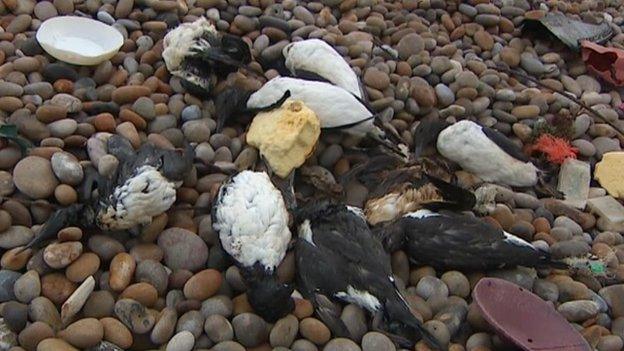
Thousands of birds could be dying along the coast, conservationists believe
Hundreds of dead and distressed birds are still being washed up on a beach in Dorset. Conservationists believe a deadly combination of storms and pollution are to blame.
"It's a large population of birds that's gone. It's appalling and it seems to be no end to it."
Conservationist Derek Davey is one of a number of volunteers helping clear up litter washed on to Chesil Beach by the recent storms.
Among the litter is a grimmer debris - the carcasses of hundreds of dead birds.
They include razorbills, guillemots, kittiwakes, puffins and auks. Mr Davey said he thought thousands could have died in total.
"There are still birds out there coming in and they're going to die tonight," he says.
Recent storms and pollution are thought to be the cause as some of the birds are covered in oil.
Lumps of what is thought to be palm or vegetable oil have also been found washed up along the beach.
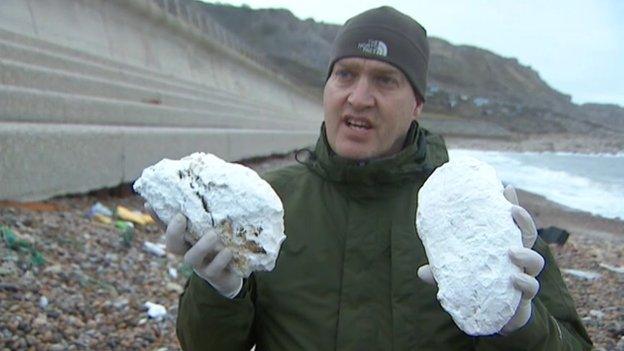
Steve Trewhella thinks the pollutant is palm or vegetable oil dumped somewhere in Lyme Bay
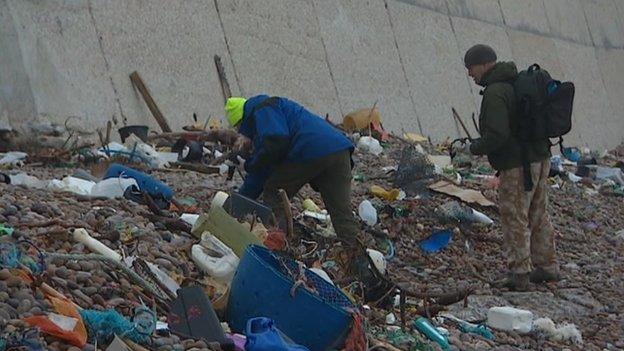
Volunteers have been trying to clean the debris and dead birds from Chesil Beach
It is thought that birds exhausted by the severe weather were struggling to feed, becoming weaker as a result. Any birds that became covered in oil would have also struggled as the substance impairs their waterproofing.
Dorset Wildlife Trust said some birds had been washed ashore alive but even those were found to be exhausted, weak and hungry.
"The whole beach is covered in these large lumps of what we believe to be either palm or vegetable oil," said Steve Trewhella, a conservationist and photographer from Wareham.
"It's a smelly rancid substance. I believe it's a danger to dogs, it must undoubtedly be a danger to wildlife."
He believes the oil was probably dumped somewhere in Lyme Bay.
'Landfill site'
"A majority of this litter is from the shipping and fishing industry. Some of it is from as far away as Newfoundland, Canada, but the majority of it is fairly local.
"There have been hundreds of birds washing up for a couple of weeks now - it's exceptional numbers.
"These are birds that are quite far out to sea and are probably dying of exhaustion [due to the stormy weather].
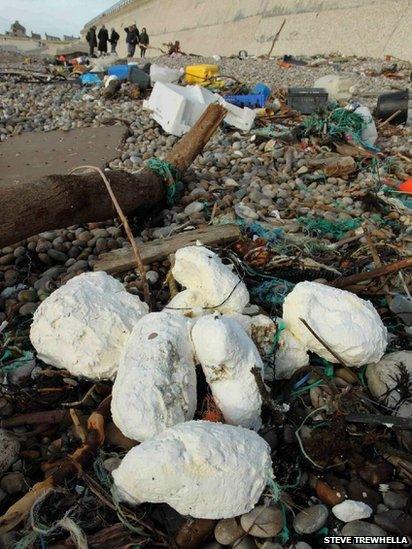
The lumps are strewn across the beach
"The problem is they are already under so much pressure from fishing, pollution, PIB oil and all these other pollutants.
"These natural occurrences just put unbearable pressure on things that are already in decline."
Local volunteers have been clearing up rubbish and rescuing birds.
Mr Trewhella called on the government to help.
"It's very depressing. This a world heritage site - it looks more like a landfill site.
"I feel like dragging local MPs and councillors down to this beach and saying: 'Look, dead birds everywhere, pollution. This is something that needs to be tackled at government level'."
The deaths follow the PIB [polyisobutene] incident last year, where more than 1,000 sea birds were found dead on the south coast, covered in a deadly sticky glue substance.
PIB - a lubricant used to improve the engine performance of ships - was found on seabirds, mainly guillemots, in two separate instances between January and May.
It was thought to have come from a ship washing out its tank at sea.
The incident led to the International Maritime Organisation (IMO) reclassifying PIBs from 2014, meaning ships can now only wash their tanks and dispose of all PIB residues while in port.
Dorset Wildlife Trust urged anyone who finds dead or injured birds not to touch them and instead contact the Chesil Beach Centre, external or the RSPCA, external.
The Maritime and Coastguard Agency (MCA) said it had also received reports of small amounts of substances washing up on the Isle of Wight and Littlehampton over the past two weeks.
A spokeswoman said: "With the recent storms in the Atlantic, substances far out to sea may have been churned up and brought ashore by the treacherous conditions.
"The MCA continues to monitor all sources of information on pollution at sea through shipping aviation and satellite surveillance.
"As, and when, we receive relevant information the MCA is ready to act to try to determine the source of that pollution."
- Published18 February 2014
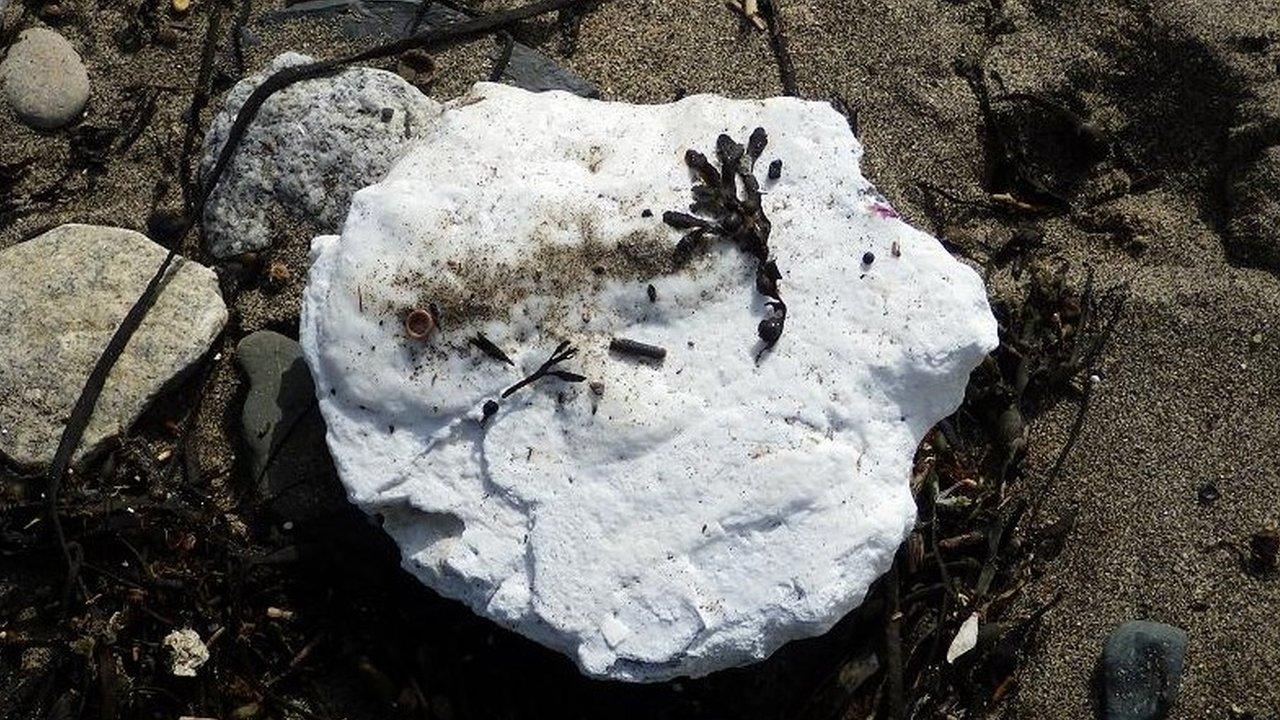
- Published10 February 2014
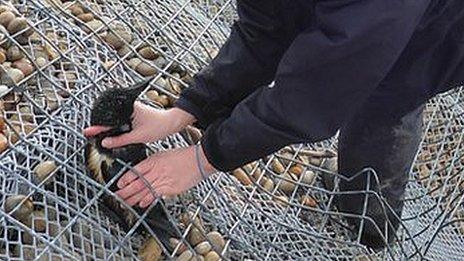
- Published16 April 2013
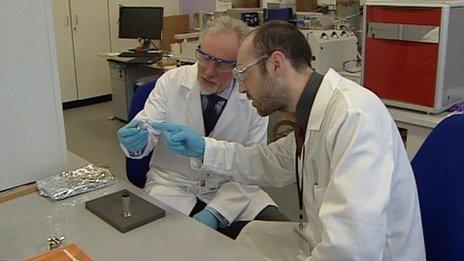
- Published15 April 2013
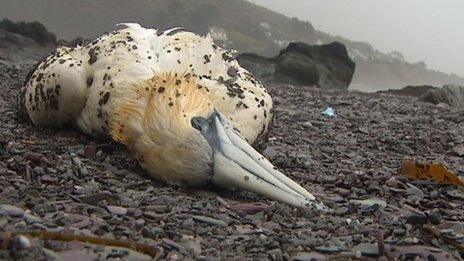
- Published15 April 2013

- Published14 April 2013
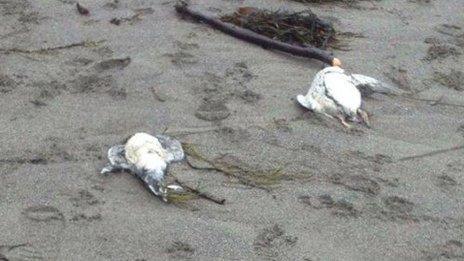
- Published5 January 2011